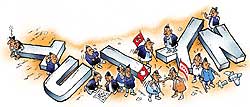 Prime Minister Lokendra Bahadur Chand has been so busy launching CDs and giving speeches about the importance of art and literature for national upliftment, that he doesn't seem to have time for much else.
Prime Minister Lokendra Bahadur Chand has been so busy launching CDs and giving speeches about the importance of art and literature for national upliftment, that he doesn't seem to have time for much else. To be fair, Chand has been doing the rounds lobbying hard to cajole party stalwarts to lend support to his administration. But Dasain and Tihar have slowed things down, and no "untainted" politician seems eager to join his technocrat-dominated nine-member cabinet.

The public's perception is that the interim administration is off to a slow start.
The health and finance ministers did announce plans for reform: further belt-tightening on expenditure and a new health insurance scheme. But the public is skeptical about more plans, and wants to see immediate and dramatic improvements in service delivery. The one thing that has received widespread acclaim is the strong action by the anti-corruption body to send former Home Minister Khum Bahadur Khadka, information minister Jayaprakash Prasad Gupta and others, including the chairman of Royal Nepal Airlines, to jail.
The main focus of the government's work is: a) lure political parties into the fold, and b) bring Maoists in to talk. On both, the results so far have been discouraging.
The two major political parties, Nepali Congress and CPN (UML) are still vocally defiant about the king's decision, and have refused point-blank to join the Chand cabinet. Both are mobilising the party machinery for mass meetings in the coming weeks. "The situation is forcing us towards confrontation, even though we want to avoid it," UML leader Madhav Kumar Nepal told his party paper.
Despite their tough talk, the political leadership realises that public opinion is still cautiously supportive of the king's action. And Chand's lobbying has partly paid off: he finally secured official blessings of his own party, the RPP. While he takes the softly-softly approach, Chand seems to be letting his deputy, Badri Prasad Mandal of the Sadbhavana Party, carry the big stick. Mandal is hammering political parties for not joining the government. He told a meeting in Kathmandu last week: "The government will march on even if the major parties don't join us."
Sources close to Baluwatar told us Chand is wooing some big-name Congress and UML as well as more RPP and NSP leaders. He may also add technocrats and "politically savvy" figures to help him negotiate with Maoists, the source said.
And that is Chand's biggest challenge. The Maoists have been playing good-cop-bad-cop, alternating seemingly conciliatory statements with hardline ones to divide political parties and the king. Prachanda has renewed his call for a roundtable between the king, political parties and the Maoists to debate a constituent assembly and have hinted that they may accept the constitutional monarchy if the king agreed to relinquish control over the army. However, Baburam Bhattarai this week published an uncompromising republic-or-nothing statement that dashed all hopes that the Maoists were bending.
While there are no signs of direct talks between the government and the rebels, sources say secret contacts have been established "at the highest level". India's role is said to be pivotal here, since the Maoists use Indian territory for training, supplies and shelter. New Delhi says it wants the king to take the political parties on board while negotiating with the rebels, but disunity among political parties and their mistrust of the king's intentions is preventing this approach.


